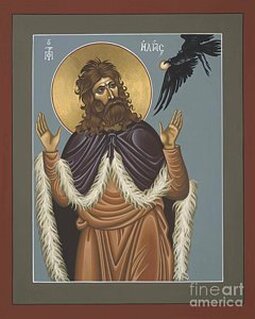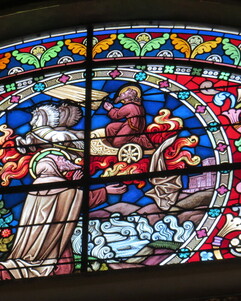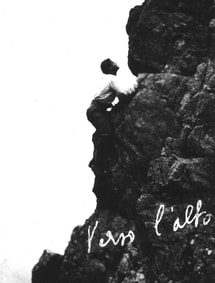 Yahweh is my God Yahweh is my God My favorite Old Testament figure is Elijah, without a doubt. What I love most about this man whose name means “Yahweh is my God,” is his ‘gumption.’ That is, Elijah was willing to stand against those in power who were influencing the people of Israel to turn away from God and follow their pagan gods instead. It had gotten to the point where the Israelites were so far from God that they had become corrupt morally. There were some minor prophetic groups referred to as guild prophets, but they were totally ineffectual. It seems that no one would take a strong stand, except Elijah, who when called upon by God, did what had to be done. Not only did he confront the king and his conniving wife, but Elijah spoke and acted with such authority that the rulers felt threatened, desiring therefore to silence him. The fact is, the authority with which Elijah spoke was greater than theirs and they were right to be frightened of him as they persisted in their evildoing. Elijah’s authority came from God, and while we do not know why God chose him particularly, perhaps the clue is in his name: Elijah was totally dedicated to the Lord who alone was his God.  Taken to Heaven in a fiery whirlwind Taken to Heaven in a fiery whirlwind Elijah boldly confronted King Ahab and his wife Jezebel concerning their perversion of the faith, and hence, the people. Early in his ministry, he challenged the ‘prophets’ of the false god, Baal, to a kind of contest to show whose god was real, proving by the finish that the God of Israel is the only true God. (1 Kings 18) To accomplish this, Elijah had to trust God radically and completely, acting with an authority that was beyond that of the Israelite people who had swung over to pagan practice, hundreds of prophets of Baal, and the king and queen, all combined. Even though he proved whose God was real, he ended up fleeing for his life to escape the wrath of the queen. But Elijah had God with him, and although he became frustrated and tired, God met his needs lovingly and gently (1 Kings 19) subsequently providing a co-worker who would soon take over where Elijah would leave off. Knowing it was time, he took this protégé, Elisha, to the Jordan River and there Elijah was taken to heaven in a fiery whirlwind. (2 Kings 2) When Elijah was taken up, Elisha received what he desired, (symbolized by taking up the mantle which Elijah had dropped), following in Elijah’s footsteps, speaking and acting with the authority of God.  You have the words of eternal life You have the words of eternal life What also stands out is the behavior of the witnesses to Elijah being taken up. In the passage, (2 Kings 2:9-15), 50 guild prophets watched as the fiery chariot took him and Elisha received his mantle. Although they were witnesses, they did not seem to believe what they had seen. These people did have some sort of prophetic gift, but for whatever reason they would not believe, their behavior consistent with their continual reluctance to act.* The reason for this could be that they effectively rejected their own authority by clinging to the safety of ‘the background’ rather than truly taking any kind of controversial stand. This is comparable to what many did when Jesus was preaching during His ministry. If He said something they could not fathom or which seemed controversial, the people would abandon Him, such as when Jesus preached the Bread of Life discourse and everyone ran off except the 12. When Jesus asked them why they did not also leave, Peter replied, “Master, to whom shall we go? You have the words of eternal life….” (John 6: 67-69) In short, they recognized the authority of God revealed in Jesus’ words and actions. There are also multiple passages about demons who recognized Jesus as the Son of God, and because of it, were cast out by Him because they could not stand up to His authority.  The strength love gives The strength love gives There are also stories of Sts. Peter and Paul, other apostles, and numerous saints throughout history who spoke with authority, because in accepting the call to serve the Lord, they were empowered by grace to do so. One who comes to mind is Blessed Pier Giorgio Frassati, (feast day, July 4). Bl. Pier Giorgio is known for heroically helping the poor, but many do not realize that he also stood up against the Fascists in the early 1920’s, participating in rallies and marches, often as the organizer. He once said, “To live without faith, without a patrimony to defend, without a steady struggle for truth – that is not living, but existing.” In other words, if we are going to follow Jesus, we must be willing to act boldly with the authority that comes from Him, the authority to live the Truth we have been given through faith. While we might not be called to participate in public marches as was Bl. Pier Giorgio – (and some of us might be) – we do act with authority when we live our faith unapologetically through our moral choices, acts of kindness and mercy, forgiveness of those who have wronged us, speaking up and acting on behalf of the oppressed, sharing about Jesus with those who may not know Him, or even something as simple as being willing to pray in public before meals. As those baptized, we have been given the graces we need to live as Christians with authority, not to ‘lord it over’ others or bully them into submission, but rather to live like Elijah, St. Peter, or Bl. Pier Giorgio Frassati, acting with love and the strength love gives. That is all the authority we need since, indeed, God is love.  May we trust in the authority of Jesus May we trust in the authority of Jesus May we trust in the authority of Jesus given through His teaching and through grace! May we be willing to stand up for our faith in our everyday life! And may our faith truly be visible in our acts of love! Let us meet in the Heart of Jesus! Peace! ©Michele L. Catanese * Guild prophets were groups that were formed for worship and cultic song and dance. They would go into a frenetic state when they prayed, and I suspect they were actually more of a distraction then they were helpful. However, they did live in communities outside of towns and were known to act as messengers and aids rather than to actually give any real prophecy. Mostly in the background, they were more like ‘groupies’ that followed whoever had the power and therefore, the attention of the public. But in reality, their function was limited and they were not that highly esteemed. (A description is found in Dictionary of the Bible, John L. McKenzie, SJ, page 694) Images: 1. Icon, Holy Prophet Elijah, by Fr. William Hart McNichols. You can find it at fineartamerica.com/featured/holy-prophet-elijah-009-william-hart-mcnichols.html 2. My photo, stained glass, Elijah in the Whirlwind. 3. My photo, Puerto Rico. 4. Photo, Blessed Pier Giorgio Frassati. 5. My photo, on sand dunes by Lake Michigan. Note: In compliance with GDPR rules, I wish to make it clear that I do not gather any information on any of my readers at any time. Comments are closed.
|
Heart Speaks to Heart
|

 RSS Feed
RSS Feed

